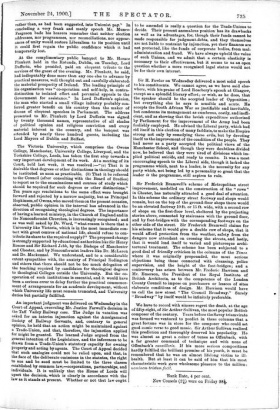An important judgment was delivered on Wednesday in the Court
of Appeal, overruling Mr. Justice Farwell's decision in the Taff Valley Railway case. The Judge in vacation was asked for an interim injunction against the Amalgamated Society of Railway Servants, and, contrary to general opinion, he held that an action might be maintained against a Trade-Union, and that, therefore, the injunction applied for might be granted. The learned Judge argued from the general intention of the Legislature, and the inferences to be drawn from a Trade-Union's statutory capacity for owning property and acting by agents. The Court of Appeal decided that such analogies could not be relied upon, and that, in the face of the deliberate omissions in the statutes, the right to sue and be sued must be limited to the three classes established by common law,—corporations, partnerships, and individuals. It is unlikely that the House of Lords will upset the decision, which is clearly in accordance with the law as it stands at present. Whether or not that law ought to be amended is really a question for the Trade-Unions to decide. Their present anomalous position has its drawbacks as well as its advantages, for, though their funds cannot be made responsible for judgment-debts, and they themselves are not liable to restraint by injunction, yet their finances are not protected, like the funds of corporate bodies, from mal- administration and fraud. We have always upheld the value of such Unions, and we admit that a certain elasticity is necessary to their effectiveness, but it seems to us an open question whether a more recognised legal status would not be for their own interest.










































 Previous page
Previous page